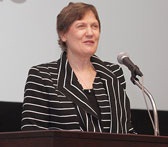 Brazil’s President Dilma Rousseff said recently that “Not only is it possible to grow and to include, protect, and conserve at the same time, but also truly sustainable development requires that we do so.”
Brazil’s President Dilma Rousseff said recently that “Not only is it possible to grow and to include, protect, and conserve at the same time, but also truly sustainable development requires that we do so.”
I entirely agree.
We need to find ways of creating human progress which do not fundamentally undermine the ecosystems of the one planet on which we dwell. For me, achieving sustainable development is not about trading economic, social, and environmental objectives off against each other. It is about seeing them as interconnected objectives which are best pursued together.
The act and consequences of reducing environmental degradation, for example, can stimulate employment and reduce poverty. The reverse is also true: in degrading the environment, a country can undermine the long-term prospects of its economy and society.
In about two months, the international community will meet in Rio for the United Nations Conference on Sustainable Development, or what is called Rio +20. So often, discussions about sustainable development seem to focus on its environmental pillar, and neglect its connections to the nature of economic and social development. All three dimensions need to be addressed at Rio +20.
The recent report by the Intergovernmental Panel on Climate Change notes that increases in extreme weather are already a discernible trend. That, together with depletion of natural resources and more frequent natural disasters, pose a real and increasing threat to development progress.
All nations are vulnerable, but the world’s one billion people living in extreme poverty face disproportionate risks, and have the least capacity to reduce those risks.
Degraded ecosystems take an ongoing toll of human life, too. The World Health Organization estimates that 23 percent of all deaths worldwide could be prevented through improvements in areas like water and sanitation, and indoor and urban air quality. Preventable diseases directly linked to contaminated water and polluted air claim the lives of around three million children under five years of age each year, with these fatalities concentrated in Africa and South Asia.
Pursuing environmental sustainability, therefore, becomes essential for tackling the vast and unfinished agenda of ending extreme poverty and inequity. By implementing what UNDP describes as “triple win” policies and programming across the pillars of sustainable development, a number of countries are advancing their economic, social and environmental objectives simultaneously, and show the potential such initiatives have to go to scale.
In Niger’s southern regions, trees are an important asset for local farmers, serving as windbreaks which protect crops from sandstorms, helping to retain moisture in soils, and drawing nutrients to topsoil. The government, in partnership with the development community, has supported locally managed reforestation initiatives which rely on traditional knowledge, local resources, and the experimentation and adaptation of farmers themselves.
Thus far, under this initiative, local farmers have reforested five million hectares, or about four percent of the country’s land area. The area which has benefited increased its cereal yields by 100 kilograms per hectare in 2009, improving livelihoods and food security for some 2.5 million people.
As growing numbers of households could see that these methods could make their farms more productive and resilient, they took their own individual and collective actions to scale up the initiative. Local governments then helped by reforming regulations and offering tangible support, demonstrating the power and importance of community engagement and ownership.
In mid-February I visited Niger, which, like neighboring countries in the Sahel, is currently experiencing an exceptionally severe drought. I saw there the stark contrast which existed between a village where basic water infrastructure had been installed and enabled food to be grown, even in severe drought conditions, and a village, only a few kilometers away, where the health clinic was overwhelmed by hungry and malnourished mothers and children whose food stocks had run low.
Funding per se is not necessarily a major constraint to pursuing sustainable development. What matters more is whether or not governments are willing to embrace it, and whether they (and development partners where relevant) invest in the capacity required to do so.
Rio +20 could draw attention to the heavy costs of doing business as usual, and increase the understanding of sustainable development as a source of green and inclusive growth and innovation.
Rio +20 could highlight the benefits of removing or redesigning those incentives which currently favor unsustainable expenditures. For example, governments spend nearly one trillion US dollars annually on environmentally unsustainable subsidies, including for fossil fuel production. Abolishing or curtailing such subsidies would promote both economic and environmental sustainability, but the social impact on the poor would need to be mitigated for this approach to be acceptable.
Rio +20 offers an opportunity to strengthen international governance for sustainable development. It could establish a mechanism to evaluate and review progress.
At Rio +20, support is likely to be given to the establishment of a set of Sustainable Development Goals. They could build on the success of the MDGs by linking the drive for poverty reduction and social goals with that for environmental sustainability.
The question being posed in the lead up to Rio is, “What kind of world do we want to live in?” I personally want to live in a sustainable and equitable world, where decisions taken at all levels are driven by respect for and promotion of people’s choices, freedoms and opportunities, while also respecting the boundaries of nature.
I want to live in a world where the goals we aspire to and plan around are not only sustainable and equitable, but transformational, universal, and able to galvanize individual and collective action.
Helen Clark is the Administrator of the United Nations Development Programme and the former Prime Minister of New Zealand.
You can read about the lecture given by Ms. Clark on this topic at Cambridge on April 18th in The Guardian (UK).




